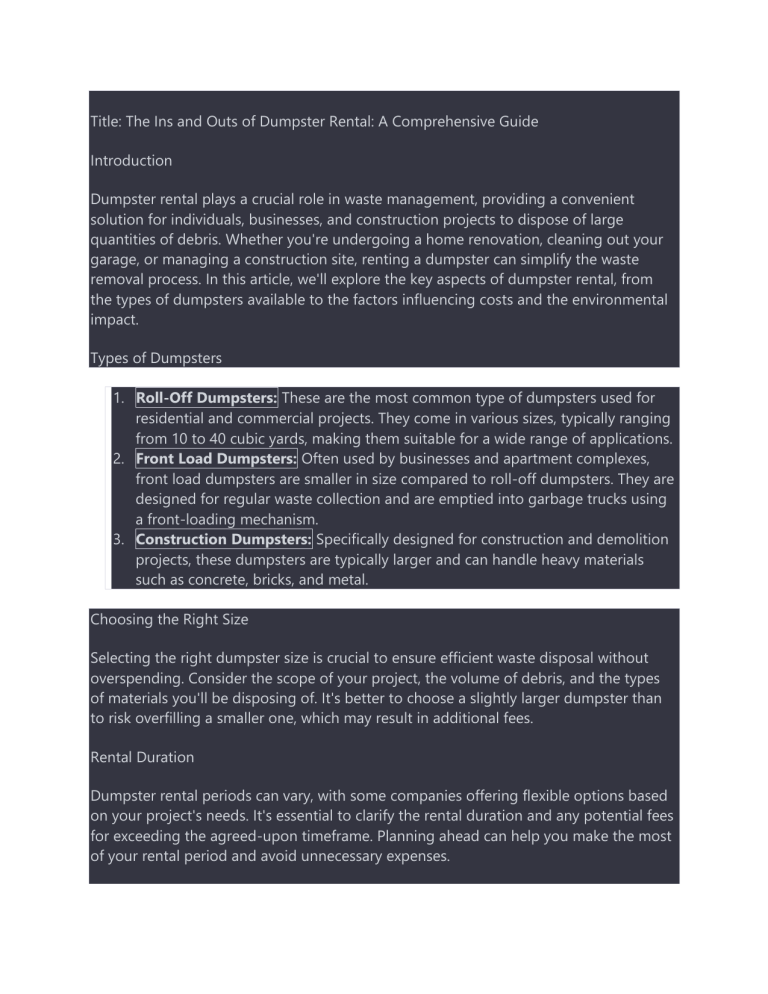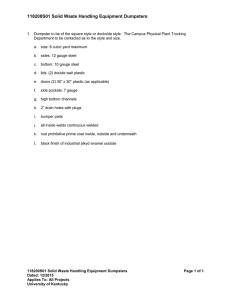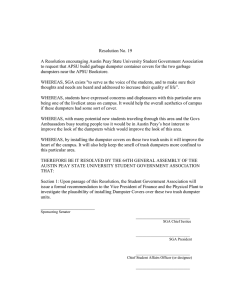
Title: The Ins and Outs of Dumpster Rental: A Comprehensive Guide Introduction Dumpster rental plays a crucial role in waste management, providing a convenient solution for individuals, businesses, and construction projects to dispose of large quantities of debris. Whether you're undergoing a home renovation, cleaning out your garage, or managing a construction site, renting a dumpster can simplify the waste removal process. In this article, we'll explore the key aspects of dumpster rental, from the types of dumpsters available to the factors influencing costs and the environmental impact. Types of Dumpsters 1. Roll-Off Dumpsters: These are the most common type of dumpsters used for residential and commercial projects. They come in various sizes, typically ranging from 10 to 40 cubic yards, making them suitable for a wide range of applications. 2. Front Load Dumpsters: Often used by businesses and apartment complexes, front load dumpsters are smaller in size compared to roll-off dumpsters. They are designed for regular waste collection and are emptied into garbage trucks using a front-loading mechanism. 3. Construction Dumpsters: Specifically designed for construction and demolition projects, these dumpsters are typically larger and can handle heavy materials such as concrete, bricks, and metal. Choosing the Right Size Selecting the right dumpster size is crucial to ensure efficient waste disposal without overspending. Consider the scope of your project, the volume of debris, and the types of materials you'll be disposing of. It's better to choose a slightly larger dumpster than to risk overfilling a smaller one, which may result in additional fees. Rental Duration Dumpster rental periods can vary, with some companies offering flexible options based on your project's needs. It's essential to clarify the rental duration and any potential fees for exceeding the agreed-upon timeframe. Planning ahead can help you make the most of your rental period and avoid unnecessary expenses. Cost Factors Several factors influence the cost of dumpster rental: 1. Dumpster Size: Larger dumpsters generally cost more than smaller ones. 2. Rental Duration: Longer rental periods often come with higher costs. 3. Location: Dumpster rental prices may vary based on your location and the disposal regulations in your area. 4. Type of Debris: Certain materials, such as hazardous waste or electronics, may incur additional fees. Environmental Considerations Dumpster rental companies often have guidelines regarding the types of materials that can be disposed of in their dumpsters. It's crucial to adhere to these guidelines to ensure proper waste disposal and minimize the environmental impact. Consider recycling options for materials that can be reused, reducing the overall ecological footprint of your project. Conclusion Dumpster rental provides a convenient and efficient solution for managing waste during various projects. By understanding the types of dumpsters available, choosing the right size, and considering cost factors and environmental considerations, you can make informed decisions to streamline your waste removal process. Whether you're a homeowner, business owner, or contractor, renting a dumpster can be a valuable asset in maintaining a clean and organized space.



